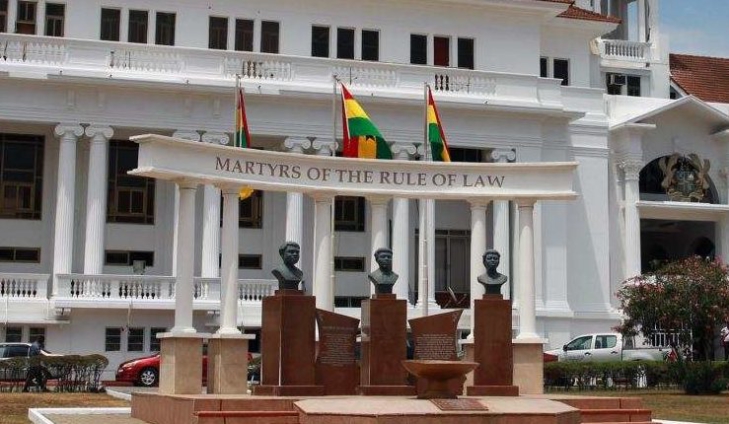President Nana Addo Dankwa Akufo-Addo may have packed the Supreme Court, but it remains the best forum for ex-President John Mahama to either overturn or affirm the results of the 2020 Presidential Election announced by the Electoral Commission.
The declaration of the incumbent President as the winner of the fiercely and tightly contested election has been disputed by the National Democratic Congress (NDC). The largest opposition party has described the results as “fictionalised,” and announced its unwillingness to accept same. Mr Mahama has been emphatic that he won the presidential poll and its party garnered enough seats to form the Majority in the 9th Parliament.
The NDC Presidential Candidate had later declared that: “Despite all of the ruling party’s inducements, use of monetary enticements, and other such schemes on a scale never before seen in this country, the good people of this country understood what was at stake, and it was clear, as the result of the votes that were legally cast that the National Democratic Congress (NDC) won the Presidential and Parliamentary elections.”
There has been a string of protests by supporters of Mr Mahama over the election results declared by the Electoral Commission, Jean Mensa. While the supporters have a legitimate right to protest, I believe the best approach to resolving this dispute is through the power of the court. This was ably done in 2012 after Mr Akufo-Addo lost the election to Mr Mahama who was the then President and went to court in Ghana’s first-ever disputed Presidential election, to challenge the results.
I am glad the NDC has chosen the same path. “The NEC decided that the NDC will contest the results of the rigged elections in the Supreme Court other appropriate fora,” read a statement signed by the NDC General Secretary and dated December 29, 2020.
What I believe should be of concern to all well-meaning Ghanaians is not the decision by the NDC to go to court. This is to be expected. Rather, it is the attempt by some elements in the country to bastardise the apex court before it finally hears the matter. We have politicised everything around us, but this should not be extended to the court. It is important to point out that the Ghanaian system of law guarantees “fair trial” and not “favourable outcome.” This imposes a duty on our judges to ensure that their decisions – favourable or not - will be based upon the law as it applies to the evidence presented and properly admitted, in order to do justice between the parties. This, I must state, is non-negotiable.
Presently, the 17-member apex court as it is composed has only two of the judges appointed by the National Democratic Congress. The rest were elevated by the New Patriotic Party with a total of 11 judges being appointed by President Akufo-Addo. This fact is no ground to believe the respected court will determine the matter in favour of Mr Akufo-Addo and the Electoral Commission when the evidence does not support same.
Although appointed by Mr Akufo-Addo, the Chief Justice, Anin Yeboah has announced the readiness of the Judiciary to shoulder and guard Ghana’s democracy. “I urge you all to keep your confidence in Ghana and keep betting on our democratic experiment. This is a test of our ability within this democratic system to rise to the occasion and seek redress, to right all wrongs, to seek justice, to make every vote count and to respect the sovereign will of the people. Let us not fail this test,” he said during the launch of the Fourth Edition of the Manual on Election Adjudication in Ghana.
He was forthright that “the fair determination of electoral disputes by the Judiciary serves the purpose of electoral integrity. Without such an assurance to the contestants, disputes that arise after elections may end up on the streets, resulting in violence…While not everyone will agree with all our decisions, I can assure you that they have all been motivated by the national interest, underpinned by firm judicial principles, geared towards preserving the sanctity of the Motherland.”
Whether or not Ghana will join the ranks of Cote d’Ivoire, Malawi, and Kenya where declared election results were annulled by the courts will depend on the sanctity of the evidence submitted by the NDC. The opposition party should be willing and ready to provide cogent evidence, testifying to widespread irregularities in the 7th December vote.
****
The author, A. Kwabena Brakopowers is a freelance journalist, development communications practitioner, essayist and a novelist whose works focus on communication, politics, gender, migration, international relations and development. He could be reached at Brakomen@outlook.com
Latest Stories
-
TotalEnergies CEO defends company against East Africa abuse allegations
4 hours -
Niger plans to cut number of Chinese oil workers, documents show
4 hours -
Zelensky says ‘US silence’ over Russian attacks encourages Putin
4 hours -
South Africa town leader ‘sad’ about Trump’s misuse of white crosses video
4 hours -
King’s invitation to Canada sends a message to Trump – and the world
4 hours -
EU needs until 9 July for US trade talks, chief says
5 hours -
Americans remember George Floyd on fifth anniversary of death
5 hours -
Lewandowski double seals Barca final day win at Athletic Club
5 hours -
First Lady launches GHANASCO’s 65th anniversary, praises school’s legacy
5 hours -
‘Big Four’ reunite at Nadal’s French Open farewell
5 hours -
Villa issue complaint after refereeing ‘big mistake’
6 hours -
Administrative fees at ports shouldn’t be priced in dollars – Institute of Freight Forwarders
6 hours -
Baba Rahman spotted in Black Stars camp ahead of Unity Cup
6 hours -
Omar Sterling is my all-time favourite Ghanaian rapper – Gyakie
6 hours -
Mohammed Kudus scores to seal 3-1 win for West Ham against Ipswich Town
7 hours

